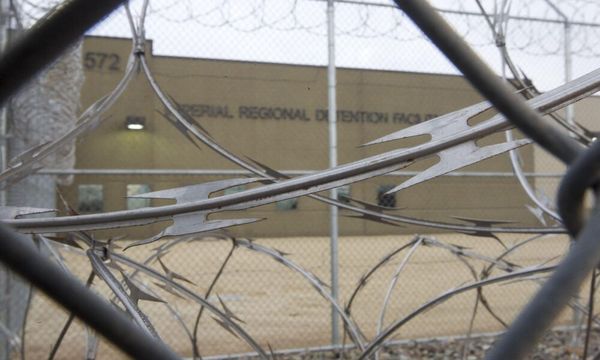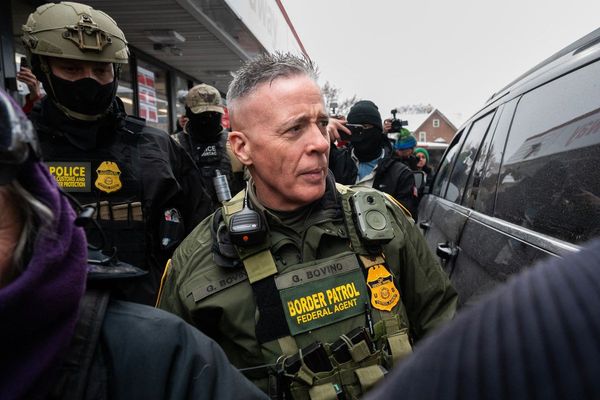
From humble beginnings growing up in a west London house so close to the railway line the window frames rattled when a train passed, the Barclay twins, Frederick and David, became an extraordinary, energetic and eccentric power couple.
They built an empire of glitzy hotels and made many millions in shipping and retail before plunging into the world of newspapers but – largely – eschewed the trappings of life in the London fast lane to live in strange isolation in a sprawling mansion on a small rocky island just off the French coast.
David, believed to be the driving force behind the newspapers side of the business, died two years ago, so is spared the indignity of the family losing control of the Telegraph titles. It is another blow to Frederick, 88, who has been embroiled in high court battles with family members over the last few years. The rise of the Barclay brothers’ empire was meteoric; the decline looks a bitter one.
The twins were born in 1934 in Hammersmith, Frederick 10 minutes before David. Their father, also Frederick, and mother, Beatrice, moved from Scotland after he lost his job as a baker. In London Frederick senior opened a shop in Olympia and worked as a travelling sweets salesman; he died when the twins were 12.
At 16 they got a taste for finance in the accounts department of the General Electric Company, but quickly concluded they preferred the idea of being their own bosses and left to become painters and decorators. They flourished, saved diligently and veered into property development, establishing an estate agents, Hillgate, in the 1960s. The twins never forgot their roots, both stubbornly including “former estate agent” when they made it into Who’s Who.

The pair began to invest in boarding houses, grabbed three London railway hotels sold off at privatisation and ultimately – in 1985 – acquired their most glittering property prize, the Ritz.
They were a brilliant team, often completing each other’s thoughts and sentences. David was seen as readier to take a risk, Frederick a little more circumspect. They were tough, but known for their good manners even during the most difficult of negotiations.
As well as the hotels, they had invested aggressively and wisely in the shipping and retail industries and by 2020 the Sunday Times rich list estimated their wealth at £7bn.
Their move into the media began inauspiciously. In 1992, they acquired the failing European, Robert Maxwell’s doomed attempt at a Europe-wide paper. They closed it in 1998 after losing an estimated £70m. Unbowed, they bought the Sunday Business newspaper (later the Business magazine) and Scotland’s premier group, Scotsman newspapers, but neither were long-term successes for them.
But in 2004 they secured what must have seemed the media equivalent of the Ritz – the Telegraph newspaper group, for £665m. Their reason for going into newspapers remains a little opaque but David was undoubtedly the keener on the industry, with Frederick once claiming: “David is the newspaper fanatic; I just sign the cheques.”
Staffers at the Telegraph titles used to suggest the brothers rarely, if ever, intervened in the editorial side of the business. But after David’s death, the former Telegraph journalist Tim Walker, who was briefly drafted in to ghostwrite the tycoon’s autobiography, said David had once told him: “I owned the toy shop and got to play in it.”
Walker described David as fervently pro-Brexit – even seeing in the Old Testament story of King Nebuchadnezzar’s dream a prophecy about the disintegration of the EU.
David told Walker he spent a lot of time discussing the EU with his “good friend” Paul Dacre, the former editor of the Daily Mail. Walker said that one of their meetings to discuss the autobiography was interrupted by a telephone call from Boris Johnson. “Boris, I am in a meeting, I shall call you later,” David said.
The twins had also been close to Margaret Thatcher, helping her secure her home in Belgravia, and the former prime minister eventually died at the Ritz.
Even if there was no strict instructions on lines the papers took, editors were well aware of the brothers’ Eurosceptic and Thatcherite sympathies.
The direction the papers took infuriated some. Its former editor, Bill Deedes, saw it as going downmarket and complained he was kept on “as a somewhat shabby mascot” to reassure readers. There were redundancies and sackings – and some scoops including the MPs’ expenses scandal, which the Telegraph papers led.
But in 2020 the media commentator Roy Greenslade wrote in the Guardian that the Daily Telegraph had been turned into a “laughing stock”, earning itself the nickname “Daily Boris” because of its slavish devotion to Johnson. Greenslade blamed the “bumbling stewardship” of the twins.
Meanwhile, the islet of Brecqhou, 80 metres from Sark in the Channel, had become a symbol of the twins’ eccentricity and desire for privacy. They had long been tax efficient, basing themselves far from their London roots in the haven of Monaco, but Brecqhou took their desire for control and secrecy to a new level. (It also probably gave them the chance to indulge their enthusiasm for cold water dips, long before the current trend.)

They bought the island in 1993 and constructed a £60m mansion designed by the neoclassical architect Quinlan Terry. Rumours and half-truths about life there circulated around Sark: a Rolls-Royce Corniche would – so it was said – transport them from their front door to their helipad 200 metres away; they had a nuclear bunker; the roads on Brecqhou were all made of marble. And so on.
In 2008 there was an amazing moment when after 450 years of feudal rule, Sark ran democratic elections. The Barclay twins put up a number of candidates but were heavily defeated, which led to them closing a number of businesses they owned on the island.
By 2019 the Barclay empire was creaking. There were rumours that all was not well between the brothers and the waters were tested for a potential sale of the newspapers.
In March 2020 the Ritz was sold for – according to claims made later in high court proceedings – half the market price. The high court case centred on alleged bugging at the Ritz and pitted Frederick against members of David’s side of the family. A truce was eventually declared after months of wrangling.
Last year Frederick was back at the high court, with a judge criticising him for “reprehensible” behaviour during a divorce battle and ordering him to pay his estranged wife £100m.
The loss of the Daily and Sunday Telegraph will not turn Frederick into a pauper. The holding company of the family’s UK assets still owns the online retailer Very and the delivery group Yodel, and this year’s Sunday Times rich list concluded he and his family are the richest people in the Channel Islands with a fortune of £6.4bn.
But the loss of the Ritz and now the Telegraph titles are definitely not the end to the rags-to-riches opera the ambitious twins from west London would have wanted.







